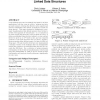Free Online Productivity Tools
i2Speak
i2Symbol
i2OCR
iTex2Img
iWeb2Print
iWeb2Shot
i2Type
iPdf2Split
iPdf2Merge
i2Bopomofo
i2Arabic
i2Style
i2Image
i2PDF
iLatex2Rtf
Sci2ools
122
click to vote
ACMMSP
2005
ACM
2005
ACM
Transparent pointer compression for linked data structures
64-bit address spaces are increasingly important for modern applications, but they come at a price: pointers use twice as much memory, reducing the effective cache capacity and memory bandwidth of the system (compared to 32-bit address spaces). This paper presents a sophisticated, automatic transformation that shrinks pointers from 64-bits to 32-bits. The approach is “macroscopic,” i.e., it operates on an entire logical data structure in the program at a time. It allows an individual data structure instance or even a subset thereof to grow up to 232 bytes in size, and can compress pointers to some data structures but not others. Together, these properties allow efficient usage of a large (64-bit) address space. We also describe (but have not implemented) a dynamic version of the technique that can transparently expand the pointers in an individual data structure if it exceeds the 4GB limit. For a collection of pointer-intensive benchmarks, we show that the transformation reduces ...
Related Content
| Added | 26 Jun 2010 |
| Updated | 26 Jun 2010 |
| Type | Conference |
| Year | 2005 |
| Where | ACMMSP |
| Authors | Chris Lattner, Vikram S. Adve |
Comments (0)

